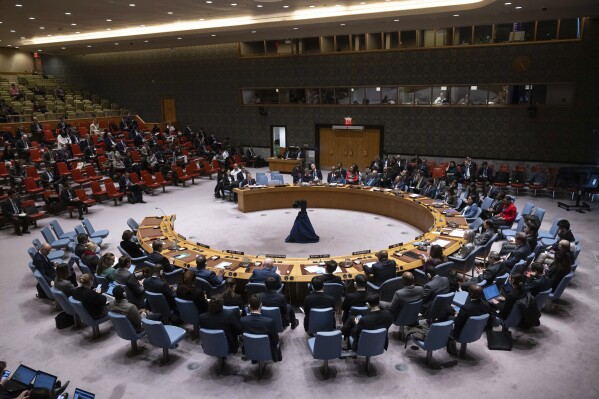Biden tells Israel’s Netanyahu future US support for war depends on new steps to protect civilians
WASHINGTON (AP) — President Joe Biden told Israeli Prime Minister Benjamin Netanyahu on Thursday that future U.S. support for the Gaza war depends on new steps to protect civilians and aid workers.
Biden and Netanyahu spoke by phone days after Israeli airstrikes killed seven food aid workers in Gaza and added a new layer of complication in the leaders’ increasingly strained relationship.
“He made clear the need for Israel to announce and implement a series of specific, concrete, and measurable steps to address civilian harm, humanitarian suffering, and the safety of aid workers,” the White House said in a statement following the leaders call. “He made clear that U.S. policy with respect to Gaza will be determined by our assessment of Israel’s immediate action on these steps.”
Biden, a Democrat, also told Netanyahu that an “immediate ceasefire is essential” and urged Israel to reach deal “without delay,” according to the White House.



The leaders conversation comes as the World Central Kitchen, founded by restauranteur José Andrés to provide immediate food relief to disaster-stricken areas, called for an independent investigation into the Israeli strikes that killed the group’s staff members, including an American citizen.
The White House has said the U.S. has no plans to conduct its own investigation even as they called on Israel to do more to prevent the killing and wounding innocent civilians and aid workers as it carries out its operations in Gaza.
Separately, Secretary of State Antony Blinken told reporters in Brussels that U.S. support would be curtailed if Israel doesn’t make significant adjustments to how it’s carrying out the war. “If we don’t see the changes that we need to see, there will be changes in our policy,” he said.
Biden was also expected to reiterate his concerns about Netanyahu’s plan to carry out an operation in the southern city of Rafah, where about 1.5 million displaced Palestinians are sheltering, as Israel looks to eliminate Hamas following the militant group’s deadly Oct. 7 attack. Vice President Kamala Harris also joined the call.
Despite the growing divisions, the Biden administration has proceeded apace with arms transfers and deliveries to Israel, many of which were approved years ago but had only been partially or not at all fulfilled. Just this week, on Monday, the Democratic administration’s “Daily List” of munitions transfers included the sale to Israel of more than 1,000 500-pound (225-kilograms) bombs and more than 1,000 1,000-pound (450-kilogram) bombs.
Officials said those transfers had been approved before the publication of the list on Monday — the day Israeli airstrikes hit a World Central Kitchen aid convoy in Gaza, killing seven of the group’s employees — and that they fell below the threshold for new congressional notification. Also, they noted that the bombs are not for delivery to Israel until 2025.
Israel has acknowledged responsibility for the strikes but said the convoy was not targeted and the workers’ deaths were not intentional. The country continues to investigate the circumstances surrounding the killings.
Andrés harshly criticized the Israeli military for the strike, and his organization has paused its work in Gaza.
“The Israeli government needs to stop this indiscriminate killing. It needs to stop restricting humanitarian aid, stop killing civilians and aid workers, and stop using food as a weapon,” he wrote on X. “No more innocent lives lost.”
The war in Gaza began when Hamas-led militants stormed into southern Israel, killing some 1,200 people, mostly civilians, and taking around 250 people hostage.
The Israeli military campaign in Gaza, experts say, sits among the deadliest and most destructive in recent history. Within two months, researchers say, the offensive already had wreaked more destruction than the razing of Syria’s Aleppo between 2012 and 2016, Ukraine’s Mariupol or, proportionally, the Allied bombing of Germany in World War II. It has killed more civilians than the U.S.-led coalition did in its three-year campaign against the Islamic State group.
___
AP writers Matthew Lee in Brussels and Chris Megerian contributed.
Disclaimer: The copyright of this article belongs to the original author. Reposting this article is solely for the purpose of information dissemination and does not constitute any investment advice. If there is any infringement, please contact us immediately. We will make corrections or deletions as necessary. Thank you.







